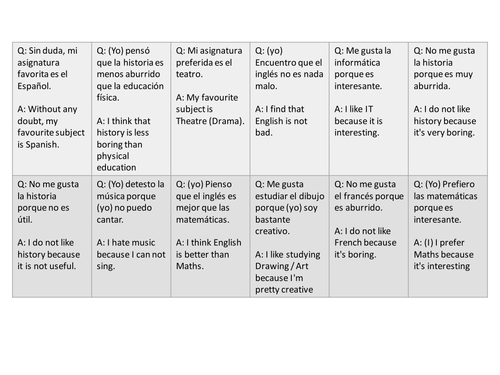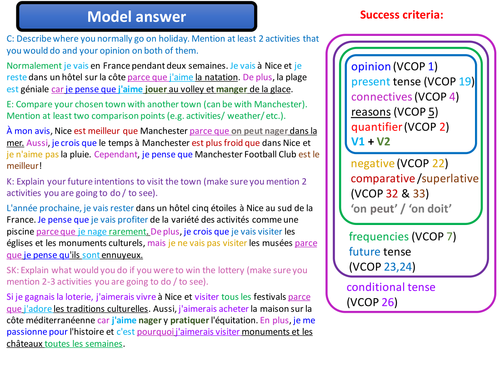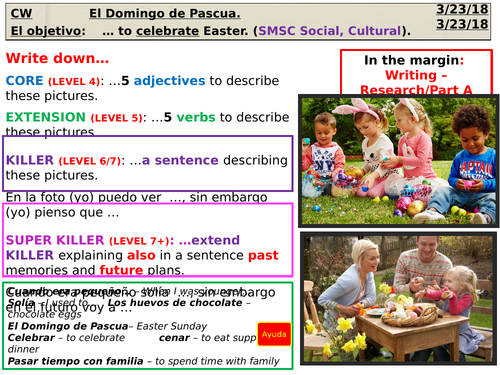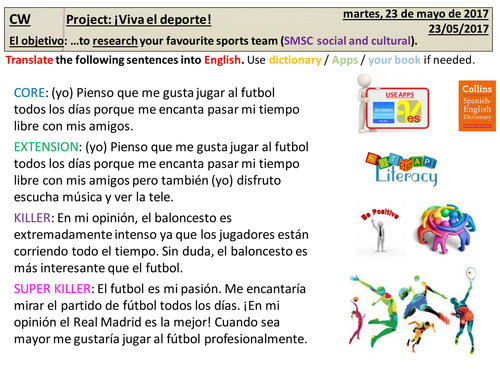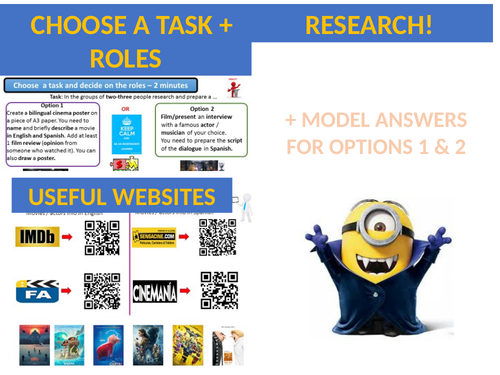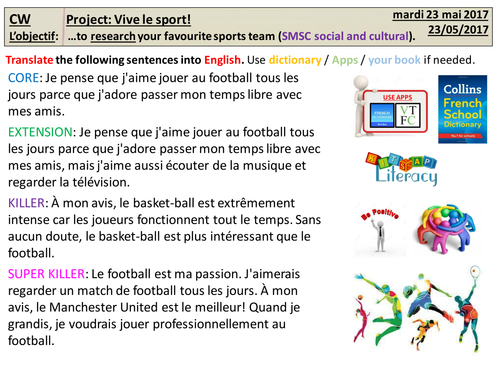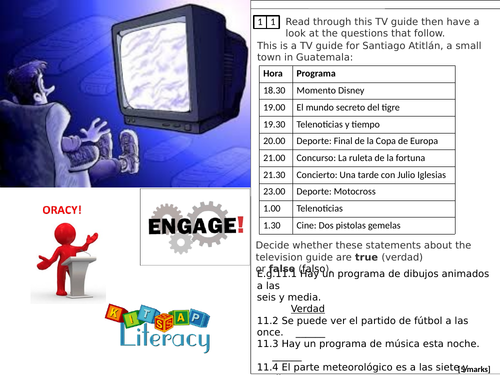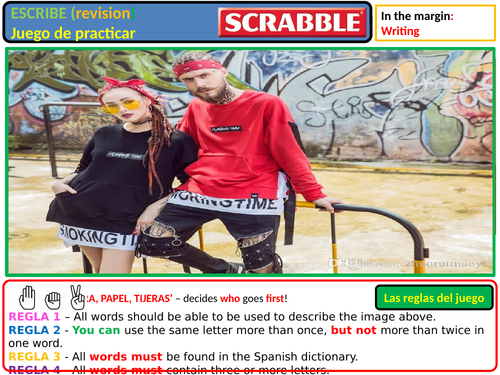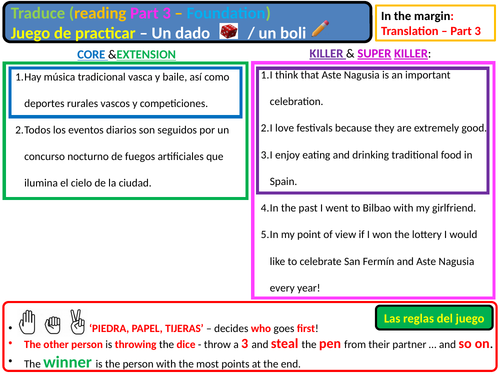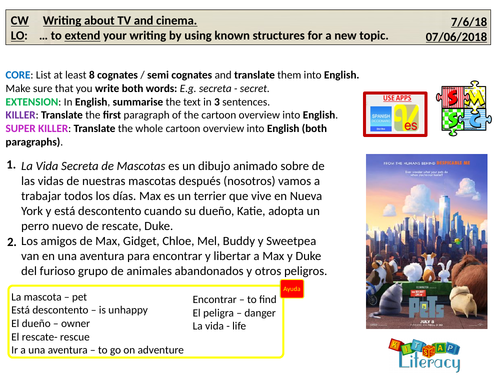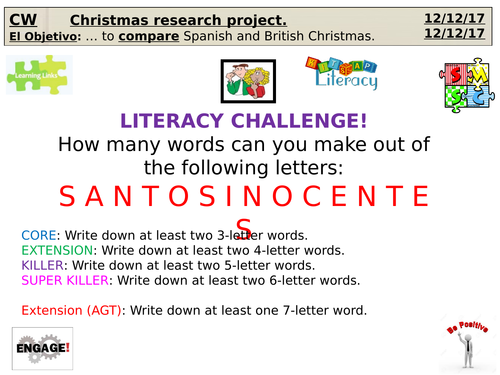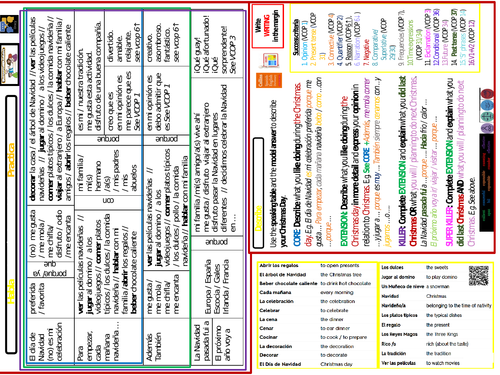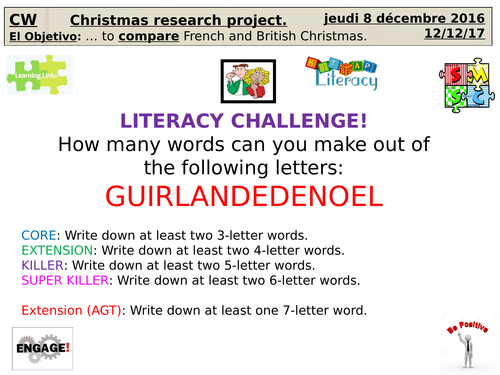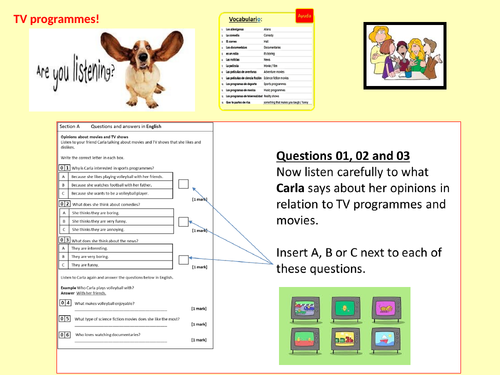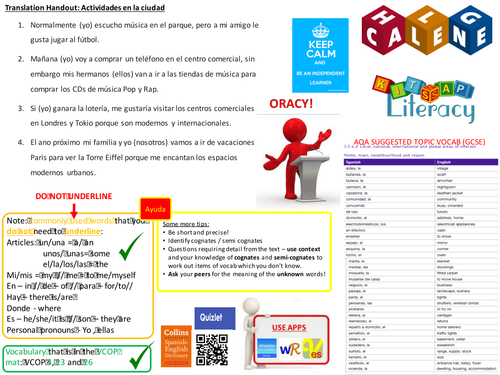
121Uploads
35k+Views
5k+Downloads
Languages

Opinions on studies - Spanish- AQA (new spec) GCSE Reading (Section A) practice
This is a lesson on opinions ad subjects for a GCSE Spanish class. The lesson includes a literacy (scramble style) starter, a Mini-test on present tense verbs conjugation ( I often give these ones), a quizlet on the words that would be used in the reading task, and a reading task itself. I am trying to teach them how to approach these tasks in the most effective way so they underline the words they know and find out the ones they do not. I wrote the text myself on the basis of the one from the specimen materials for it to have a similar structure to the one they will see in the exam. Finally they self-assess their work (and learn new words!). I also attach a quiz quiz trade that I have prepared for the end of the lesson to revise the previously learned grammar and vocabulary.

Research project (Motivational triggers) for KS3 French - Bon voyage (Holidays) (AQA new spec)
This is a research project lesson (or two lessons really) that I created for my year 7 French students. The writing example can be easily adapted if more structures are to be added. The idea is to promote independent learning via research. Students have to research information about the place that they would like to visit (any place in world really but I encouraged to visit France). Students decide on the task and start researching relevant information about the chosen location using their iPads/ Chromebooks. At the same time they create a poster or a travel brochure with pop-up images (!!!) about the chosen location. During the second lesson they distribute the writing task bullet points in-between the members of the group and complete a piece of writing as per success criteria and model answer. In the end they stick their written notes (or attach them) to their poster /travel brochure. The whole process takes about 2 lessons and is perfect for the end of the topic as you can incorporate all of the structures / vocabulary learned during the term! Note: the writing example is oriented on the revision of tenses studied this year, holidays, weather and location vocabulary. Please let me know if you have any other ideas on how this project can be implemented. If you still have some time left you can enjoy few games I have inserted to simply have fun during the (possibly) last lesson of the year.

El Domingo de Pascua (SMSC - Cultural) Spanish (AQA) KS3/ KS4 lesson
This is an Easter lesson that I created for my higher KS3/KS4 Spanish students. The idea is to have some fun and to do some writing as well!
The lesson starts with a friendly - easy starter, lesson plan and pronunciation slide to learn how to pronounce some Easter related words. Then we move on to a quizlet task to learn / revise some Easter vocabulary and Rally Coach activity to check whether we remember the words (translation practice). I have then included a conjugation activity with some verbs (you need some dices!) followed by a competitive translation activity (make sure you have similar ability students working together). The students then use a trap door structure (table) to speak about their Easter day and then I tell them about my Easter day in a similar manner as suggested by previous activity. I first use pictures only and then show them the model answer and the grammar success criteria. After they write down their responses we move on to playing quizlet live and Hangman. Enjoy!

Research project (Motivational triggers) for KS3 Spanish - Viva el deporte!
This is a research project lesson (or two lessons really) that I created for my year 7 Spanish students. See similar post for early GCSE classes. The writing example can be easily adapted if more structures are to be added. The idea is to promote independent learning via research.Students have to research information about a sports team and create a poster. After that they have to produce a piece of writing to express their opinion on that team. Students decide on the task, the roles and start researching relevant information using their iPads (one of the students needs to summarise the information that others found). The whole process takes about 2 lessons and is perfect for the end of the topic as you can incorporate all of the structures / vocabulary learned during the term!

School Rules - Spanish - AQA new spec -Exam practice (Reading, Section C)
This is a 2b lesson on school rules for a GCSE Spanish class that I happened to have an observation with (unexpectedly!). The lesson includes a literacy starter (students have to find and amend the mistake in the sentence), a mini-plenary on grammar in relation to the starter, a tongue twister slide to practise 'i' sound, a mini-test on present tense verbs conjugation ( I often give these ones), a mini-test on articles, a pronunciation slide and a quizlet on the words that would be used in the reading task, and a reading task itself. I am trying to teach them how to approach these tasks in the most effective way so they underline the words they know and find out the ones they do not. I wrote the text myself on the basis of the one from the specimen materials for it to have a similar structure to the one they will see in the exam. Finally they self-assess their work (and learn new words!). This lesson includes the explanation on how to use 'Spanish Dict Box' application to finds out the meaning of unknown words.

Free time activities - Spanish - AQA GCSE- Project (Motivational triggers) - 1-2 lessons
This is a research project lesson (or two lessons really) that I created for my year 9 Spanish students. It can also be used for older students as the model answer has a list of grammar / some more can be added. The idea is to promote independent learning via research. There are two choices: a bilingual movie poster (I wanted them to practise translating authentic information) about a movie of their choice or an interview with a famous actor/musician. Students decide on the task, the roles and start researching relevant information using their iPads (one of the students needs to summarise the information that others found). Those who chose the second option have to prepare a script in Spanish and if there is enough time, to make a video using iMovie or any other video application. If there is little time I would suggest them to present it and I would film it. The whole process takes about 2 lessons and is perfect for the end of the topic as you can incorporate all of the structures / vocabulary learned during the term!

Research project (Motivational triggers) for KS3 French - Vive le sport!
This is a research project lesson (or two lessons really) that I created for my year 7 French students. The writing example can be easily adapted if more structures are to be added. The idea is to promote independent learning via research. Students have to research information about a sports team and create a poster. After that they have to produce a piece of writing to express their opinion on that team. Students decide on the task, the roles and start researching relevant information using their iPads (one of the students needs to summarise the information that others found). The whole process takes about 2 lessons and is perfect for the end of the topic as you can incorporate all of the structures / vocabulary learned during the term!

AQA GCSE Spanish - SMSC/Cultural- Las Hogueras de San Juan Listening A + writing FQ1/ HQ4
This is the lesson that I have prepared for my higher y8/ and y9/y10 in relation to the topic of Spanish culture (Festivals & Celebrations).
The starter is based on the review of the cartoon called ‘The Book of Life’ (El Libro de la Vida). Students read the review and complete various tasks according to their ability. Then they check their answers, review the lesson objectives and have fun resiting a tongue twister (I personally believe phonics is the way forward for the students of all ages). Students will then learn new / revise already known vocabulary on the topic of Las Hogueras de San Juan festival using Quizlet and Quizlet live tools. I have then included a video (see link) of Rosa from SpanishPod101 (see their channel in youtube) describing the festival.
Even though the video is in Spanish and Rosa speaks really quickly, there are subtitles in English so that all students have a chance to listen to a native speaker and at the same time understand what the video is about (note: I personally find the Spanishpod101 videos amazing as they address quite a few cultural / grammar / pronunciation and other aspects so I would recommend letting your students know that a lot of resources are available for free. Consequently, students answer quiz questions about the video. I presented it as a Listening task.
Then they move on to Writing Foundation Questions 2 and 4 // Higher Tier Question 1. Students begin by translating the short text into English and coaching each other if stuck at the same time assessing each others work. Then they revise some grammar by playing tarsia game (see template in the end of the presentation).
Consequently they get on with reading the question and what is required from them and discussing the what they could include in their answer (both content and grammar structures). Then they make a break and play a dice game (can be prepared prior to the lesson or during the same - see template in the end of the presentation) and a learning grid to revise verb tenses. They then get back to the task and work in pairs to plan their answers. Finally they complete the task individually, discuss the success criteria and the marking scheme with the teacher and peer / self assess their work.
And, as a reward they play Hangman! (I have posted this slide for free within my resources - search for ‘El ahorcado’).
Please let me know if there are any problems / ideas!

TV shows / TV program - Spanish- AQA GCSE Reading (Sec. A- T/F) differentiated
This is a lesson on TV shows for an early GCSE Spanish class which can be used with a higher year 8 students. The lesson includes a scrabble starter to wake the students up followed by phonics practice (resiting tongue twister!). Then I included few slides explaining how to use VES application to check the meaning of conjugated verbs and asked them to try to find few on their own to check understanding and to encourage them to be independent.
Then they practice phonics when pronouncing new words (see new vocabulary attached - quizlet) followed by the quizlet activity. Students are to choose what quizlet task they want to do based on their level therefore this engaging task is differentiated. Then I have included a set of slides to introduce a reading section A exam task text - TV program (please note that this is a task taken from BBC Bitesize website and I bear no right on it therefore) . There is also a differentiated Rally Coach activity to consolidate the knowledge of the new vocabulary after they looked at the task whereby they try to translate the sentences in relation to opinions on TV programs. Consequently they have a look at the TV program text again and complete a series of tasks to enhance their understanding - underline cognates, discuss unknown words in a group and learn how to use Spanish Dict application (an explanatory slide given). Finally they analise the way they should answer the questions (True / False) and complete the Reading task and self-assess their work. I have included the handout with the reading task to ease the pain.
Enjoy!

AQA GCSE Photo card scrabble / Tarsia games with templates (speaking / writing /revision)
These are two grammar games that I decided to share. I would use them for pretty much all age groups, both KS3 and KS4, GCSE both tiers. They can be easily amended to suit the grammar topics that you wish to reinforce / revise / introduce. The templates can also be easily reused for French.
See enclosed:
Photo card scrabble (related to AQA GCSE speaking / writing tasks). I originally thought of this as a game prior to completing an exam task for KS4 students. The pack includes a slide and a scrabble board if you wish to organise an extended activity. Students need to come up with words related to the image, the words should contain 3 or more letters and they should be in Spanish!
Tarsia slide and template - an activity to use to revise topic / key vocabulary. Students can either create their own or just cut the one you prepare for them. They need to then match the words / expressions in English with their Spanish equivalents.
Let me know how it goes!

Spanish Translation game (AQA GCSE Reading Part C / Writing Section 3)
One of my KS4 students favourite games!
One dice, one pen (un dado, un boli) - (differentiated, AQA Reading Section C / Writing Part 3 Higher / Foundation) - Students roll dice in turns to translate the sentence correctly! If the partner throws 3 he takes over a pen. The winner is the one who collected the most points. I used it with KS4 to facilitate the exam translation tasks.
I also included a set of slides that I used to emphasize certain grammar points.
Let me know how it goes!

Writing: TV and cinema (opinions) - Spanish - AQA KS3/KS4 GCSE (Speaking / Writing)
This is a lesson on TV shows for an early GCSE Spanish class which can be used with a higher year 8 students.
The lesson starter is a differentiated reading / writing / grammar task based on the review of a famous cartoon - Secret Life of Pets. Students read the overview of the cartoon and complete the tasks. Then they check the answers followed by phonics practice (resiting tongue twister!). Then I included a mini-test to recap / check whether students remember how to conjugate ‘tener’ in present tense. Consequently they play the Speaking Cube - 6 sides of the cube are completed with the topic questions for the half-term. Students roll a cube (you can either ask them to glue them together or you can make them yourself). I figured 6 cubes per year for each year group is an easy enough task to continue repeating the questions of all half-terms for the whole school year. The template is in the end of the lesson in case you need to change the questions (colours correspond to the difficulty of the question (core- blue, extension is green, violet is killer and pink is super killer).
Then they get to revise verb 1 + verb 2 structure and complete a writing task. Before writing I tried to give them some ideas by showing them the Spanish trailer of the cartoon mentioned in the starter activity (they loved it!). The trailer is from Youtube. Finally they self/peer -assess their work by way of analising the success criteria and play a vocabulary game as a reward. The younger students might be allowed to use a dictionary or to think of any word. In any case, feel free to change the rules!
Please let me know if there are any problems / ideas! Enjoy!

Research project (Motivational triggers) for KS3/KS4 Spanish AQA - Christmas project
This is a research project lesson (or two lessons really) that I created for my KS3/lower KS4 Spanish students. The idea is to promote independent learning via research.Students have to research information about Spanish Christmas, compare the traditions with the ones in Britain and to create a presentation / poster. Students decide on the task, the roles and start researching relevant information using their iPads (one of the students needs to summarise the information that others found). There is also a designer and an analyst (usually the most attaining student in the group. Enjoy!

Your Christmas Day - KS3/KS4 Spanish (AQA)- Observation 1c/2a
This is a Christmas lesson that I created for my higher KS3/KS4 Spanish students and mainly for my lesson observation. The idea is to have some fun and to do some writing as well!
The lesson starts with a friendly - easy starter and pronunciation slide to learn how to pronounce some Christmas / winter related words. Then we move on to a quizlet task to learn / revise some X-mas vocabulary and Rally Coach activity to check whether we remember the words. I have then included a conjugation activity with the Christmas verbs (you need some dices!) followed by a competitive translation activity (make sire you have similar ability students working together). The students then use a trap door structure (table) to speak about their Christmas day and then I tell them about my Christmas day in a similar manner as suggested by previous activity. I first use pictures only and then show them the model answer and the grammar success criteria. After they write down their responses we move on to playing quizlet live and Hangman. Enjoy!
Bundle

Christmas bundle- Spanish/French - KS3/KS4 AQA
This a small bundle of two (possibly three) lessons for KS3/KS4 Spanish students. I also attach its analogue in French. Part of it is a research project than can take 1-2 lessons and another one is a lesson to describe your Christmas day in Spanish!

GCSE Spanish - SMSC / Cultural -El Carnaval - Photo Card (AQA)
This is the lesson that I have prepared for my higher y8/ and y9/y10 in relation to the topic of Spanish culture (Festivals & Celebrations) and is mostly related to El Carnaval. I used it as a general topic to look at the photo card task (speaking / foundation writing). The starter focus is reading - students complete differentiated tasks in relation to an authentic extract from on line newspaper.
Students will then learn new / revise already known vocabulary on the topic of carnivals/ festivals using Quizlet and Quizlet live tools. Then they recap on the success criteria for Speaking Q2 / Writing Q1 - Photo card- and complete a photo card task based on a photo of a carnival celebration together. They jot their thoughts first, play a catchphrase game and then prepare their responses in pairs on the second photo card. Finally they complete a third photo card task individually and self / peer assess the same. In-between the photo cards I inserted some verb games to make the lesson more fun for the students and not to let them get bored.
Let me know what you think!

Research project (Motivational triggers) for KS3/KS4 French AQA - Christmas project
This is a research project lesson (or two lessons really) that I created for my KS3/lower KS4 French students. The idea is to promote independent learning via research. Students have to research information about French Christmas, compare the traditions with the ones in Britain and to create a presentation / poster. Students decide on the task, the roles and start researching relevant information using their iPads (one of the students needs to summarise the information that others found). There is also a designer and an analyst (usually the most attaining student in the group. Enjoy!

Opinions on TV programmes - Spanish- AQA GCSE Listening (Sec. A- multiple choice / 1 detail asnwer)
This is a lesson on TV shows for an early GCSE Spanish class which can be used with a higher year 8 students.
The lesson includes a translation starter (mini-Reading Section C) to wake the students up followed by phonics practice (resiting tongue twister!). Then I included few mini-tests to recap / check understanding of basic grammar (articles, indirect object pronouns and adjectival agreement).
Then they get to know new words via online quizlet activity. Students are to choose what quizlet task they want to do based on their level therefore this engaging task is differentiated. Then I have included a quick match-up activity to check whether they remember the words they have just learned. I then introduce a Listening activity related to the opinions on TV watching preferences. It has two parts - multiple choice and one detail answer to account for two types of tasks in the Listening exam spec. Students complete a series of tasks to enhance their understanding - translate the keywords into Spanish to make the Listening easier, discuss unknown words in a group and use applications / dictionaries to find out the meaning of the unknown words. Finally they analise the way they should answer the questions , complete the task and self-assess their work. I have included the handout with the task to ease the pain. Please note that there is no listening file - see the end of the presentation for teacher’s handout and for the students one.
Enjoy!

Motivational Triggers Lesson - Build and Describe a house! French KS3/KS4 (Christmas Starter)
This is the lesson I have made for the motivational triggers week prior to Christmas. This is basically instruction on how to make and describe a house. There is also a detailed guide on how to describe the house using vocabulary on the topic of house, rooms and prepositions of place. My students totally loved the starter.
You can find the templates of a ready made house on the internet - there are quite a lot!
Enjoy taking pictures!

2 versions of AQA GCSE (new from 2016) : Activities in town - Exam practice (Reading, Section C)
This is the lesson for my GSCE Spanish class about activities in town. It includes a range of activities to satisfy the school policies, such as Independent Learning, Kagan, differentiation and engagement. I have included a short test to check vocabulary and a quizlet to learn some new words that they would use when completing the Reading activity (AQA new specification Reading Section C). I was trying to teach them how to approach text reading and translation. I also include a handout that I have prepared as an additional help. Please note that VCOP mat refers to reasons, opinions and the tenses.
I attach two versions of the same lesson as one I used with older pupils and another one was amended for the observation (I got 1c/2a feedback!)

